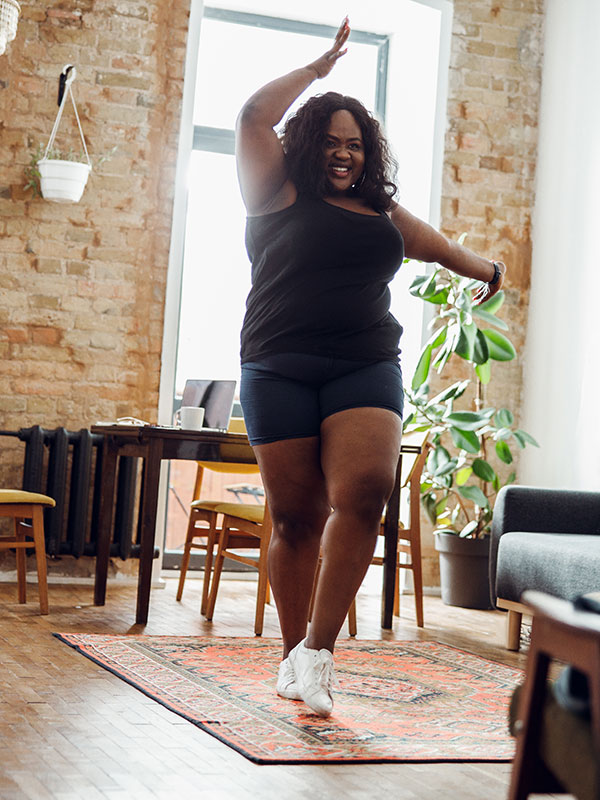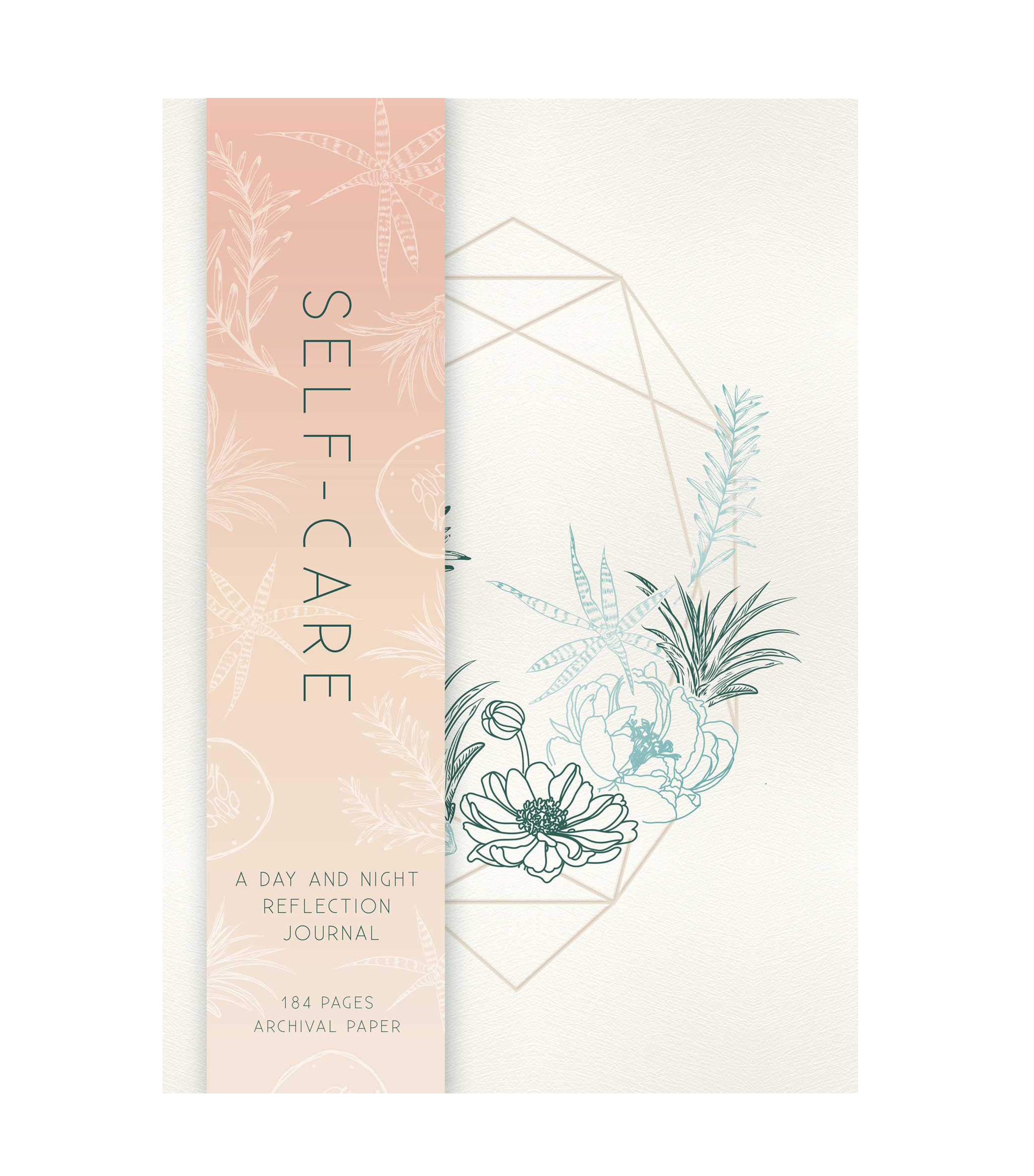It's Time to Start Being Kinder to Yourself—Here's How to Start

Recently, I've been thinking a lot about a common phrase or piece of advice that gets shared often. The wording can vary slightly, but the meaning is always the same: "Talk to yourself like you would talk to a friend." Basically, it's the whole idea of treating and speaking to yourself with kindness and compassion, because that's how you would with a friend or a family member.
It's stuck with me because it's so easy to be so hard on yourself. A lot of us are probably guilty of that. Of being so critical of our bodies. Of doubling down on negative self-talk. Of comparing ourselves to others and feeling bad when we feel we're "not stacking up."
As I've gotten older, I've been working hard to be kinder to myself and giving myself more love and compassion. It hasn't been the easiest thing in the world, but it has helped me become proud of my accomplishments, what I have in my life, and what I have done, which in turn I think leads to a happier mindset. "Finding and practicing self-love doesn't mean all positivity all the time," says Jamie Goldstein, PsyD, Therapy Experience Lead at Coa. "It also means honoring those parts of yourself that can be challenging. Practicing self-love means creating space for the parts that challenge along with the parts you love. One practice I enjoy is the practice of both/and. Coming up with examples of ways in which we can be two seemingly opposing things at once. As an example, I can be both angry and soft; I can be both excited and scared; I can be both giving and set boundaries; I can both lead and need encouragement."

One way to start practicing self-love and being kinder to yourself is by setting boundaries. "Setting boundaries and letting people know what works and what doesn't work for you creates a peaceful environment that enables you to thrive," explains psychology expert Cheyenne Bryant, PhD. "Learning to love yourself unconditionally is the epitome of self-love, an act that isn't easy to apply, however, when mastered, liberation and love on all levels exist. Surrounding yourself around people who celebrate you and not just tolerate you will keep you empowered, supported, and filled with love. Lastly, always lead and give love."
You can also take some time to think about when and where you have felt love for yourself. Abby Ruben, a licensed mental health counselor (LMHC) at Humantold, recommends reflecting upon ways in which others feel loved by others and show yourself love in the same ways. That could mean things like spending quality time alone with technological distractions, rewarding yourself with a thoughtful present, reciting affirmations, or giving yourself a neck massage.
She also suggests thinking about when you've felt more secure or proud of yourself and writing them down, which can be helpful reminders. "Pay attention to critical self-talk and become curious about it rather than simply believing everything you think," she adds.

The path to being kinder to yourself also involves avoiding harmful mindsets or habits that may stop you from accepting and appreciating yourself. The most common one is negative thinking. "We bring about what we think about. If a person's thoughts are negative then their experience will be negative," Bryant says. "It's not the circumstance that creates agony or stress, it's the way we perceive the circumstance that does. Complaining creates more to complain about and defocuses you from the solution. Any habit that creates a negative experience stops a person from appreciating themselves and others."
Another mindset that can stop your progress is forcing yourself to fit into certain stories or narratives. "Believing that we exist within the binary or 'right or wrong,' can act as a significant blocker to self-appreciation because this type of mindset removes the complexity of our experience," Goldstein says. "When we force ourselves to fit into stories or narratives that were not written by us, or for us, that discomfort can lead us away from self-love because we question ourselves as opposed to questioning the story."
And lastly, Ruben says that making self-love conditional, attempting to "problem-solve the past," excessive social media use, and comparing our complex selves to others' curated depictions of their lives are all additional mindsets and habits that can hinder self-love.

There can also be common misconceptions about self-love sometimes. Goldstein says that it's easy to internalize the myth that self-love and being kind to yourself means you're not going to hold yourself accountable. Often, self-love is about sitting with the discomfort of accountability.
Self-love does not have to be a selfish act, either. "One of the biggest misconceptions about self-love is that it is somehow selfish or narcissistic," Ruben says. "The reality is that narcissists typically devalue others and seek validation, in part, due to a lack of self-love. Loving oneself ultimately creates more space to show up for others in healthy, sustainable ways." And Bryant adds that self-love and self-care do not have to consist of treating or buying yourself something new. You can meditate, take a walk, read or listen to an audiobook, watch your favorite show, exercise, listen to music, or even take a nap.
And it's important to remember that this whole process is a process and you're probably not going to have it figure out overnight. Ruben says another misconception is that one must fully love themselves before being able to love someone else. "Humans are innately social creatures, and we learn through interpersonal experiences and nurturance," she explains. "Believing that you must be worthy of love before receiving it can paradoxically make it more difficult for you to receive the love that may already be present. Also, you can recognize that you are a person worthy of love and respect while still struggling to tap into kindness, or vice versa. While self-love and self-compassion are connected, similar concepts, they are not one and the same."
Ways You Can Be Kinder to Yourself
If you are ready to start being kinder to yourself, but don't know where to start, the experts gave us these tips that might help:
1. Give Yourself Time to Reflect
"A reflection practice allows you to tune in to what you're needing in a given moment. By doing this we are more likely to move towards meeting our needs," Goldstein says.
2. Stop the Judgement

"Judgement toward yourself is unkind and hurtful, and leaves you feeling not good enough," Bryant says. "We were all created perfect in our authenticity. Be you and love all your moving parts."
3. Celebrate Yourself

Goldstein suggests being as quick to celebrate your victories as you are to beat yourself up for your mistakes.
4. Nourish Yourself
Don't forget to take care of yourself physically, Goldstein says. That means drinking enough water, eating good food, and moving your body.
5. Fuel Yourself Emotionally
"We are feeling creatures. Giving yourself time and space to feel your feels is honoring that you're complex, validating your experiences, and inviting yourself to take up space," Goldstein says.
6. Make Self-Care a Lifestyle

"Plan daily, weekly, and monthly self-care events and be fully present. Do not mix business with your moment of pleasure," Bryant says.
7. Think About How You Would Treat a Friend

This goes back to that phrase again. "Consider what you'd do to support a close friend or loved one navigating the same experience(s)," Ruben says.
8. Develop Realistic Goals
It's okay to dream big, but you always want to make sure your expectations are doable. "Oftentimes, people beat themselves up for not growing when their basic needs, such as sleep or food, aren't even being properly met," Ruben says.
9. Be Gentle With Yourself

Yes, this is a given when we're talking about being kinder to ourselves, but it's an important reminder. Bryant says you should allow yourself to make mistakes along this journey and be okay with that.
And if you do make a mistake, don't let it get to you so much. "Respond to your mistakes the way you'd respond to a child. We don't call them names, make fun of them or remind them of their failure. We let them know, 'It's okay, we all make mistakes. We'll try it differently next time,'" Goldstein says.
10. Give Yourself Space to Change Your Mind

Goldstein says that allowing ourselves to change course when someone or something is no longer serving us, is a great kindness.
11. Compliment Yourself
It's time to give yourself some credit for your accomplishments, both big and small, and practice giving yourself compliments. One thing that can help is writing a list of things you love about yourself and reading them daily, Bryant suggests.
12. Have Fun

Everything doesn't have to be so serious—life can be joyful. "Have fun in all you do. Find laughter and light in who you are," Bryant says.
13. Don't Let Your Bad Thoughts Rule You

Don't sweat the bad thoughts. "Rather than piling on judgments when experiencing a bad mood or uncomfortable emotions, simply notice and let them be," Ruben says. "You're in control of the narratives you create around your experiences."
14. Use These Helpful Phrases

And lastly, the experts gave us these phrases or questions to reflect on as you're working on self-love and self-compassion:
Phrases:
I can be both _____ and still _____.
It's okay, we all make mistakes.
I am allowed to change my mind.
I am doing the best that I can within any given moment.
Progress over perfection.
I am enough.
I forgive myself for judging myself as ____. The truth about me is ____.
In the spirit of Buddhist Metta loving-kindness meditation, rest your hands on your heart and silently repeat: "I wish myself well, I wish myself loving kindness in my life, I wish myself deep peace."
I love everything about myself.
I'm truly an amazing person.
I'm totally killing this day!
Questions:
Is this a story that's coming from me, or someone/something outside of me?
Would I let someone else speak to me how I’m talking to myself?
How do I show others kindness?
What are my emotions signaling to me?
What do I need in this moment?
Next: This Is How Therapists Help Their Patients Practice Self-Love
This article is provided for informational purposes only and is not intended to be used in the place of advice of your physician or other medical professionals. You should always consult with your doctor or healthcare provider first with any health-related questions.
Sarah is lifestyle writer and editor with over 10 years of experience covering health and wellness, interior design, food, beauty, and tech. Born and raised in Los Angeles, she attended New York University and lived in New York for 12 years before returning to L.A. in 2019. In addition to her work at Who What Wear, she held editor roles at Apartment Therapy, Real Simple, House Beautiful, Elle Decor, and The Bump (sister site of The Knot). She has a passion for health and wellness, but she especially loves writing about mental health. Her self-care routine consists of five things: a good workout, “me” time on the regular, an intriguing book/podcast/playlist to unwind after a long day, naps, and decorating her home.




